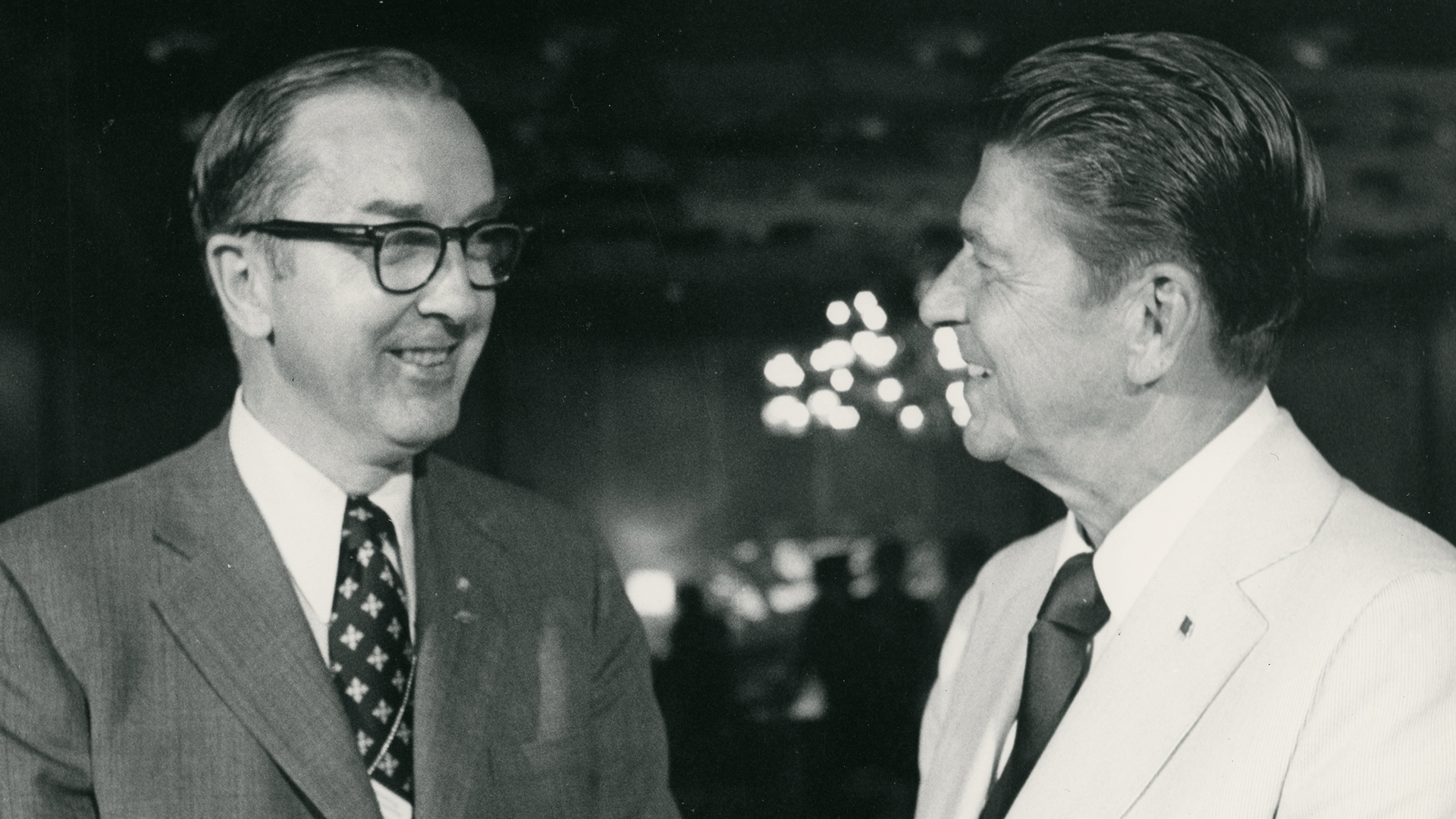The Lasting Impact of the 1976 North Carolina Republic Presidential Primary
The 1976 North Carolina Republican Primary was a watershed moment in Ronald Reagan’s political career. Senator Jesse Helms and the North Carolina Congressional Club contributed to Reagan’s victory. In our collection are letters, photographs and videos that details this important primary and shows how much it influenced the remainder of Reagan’s political career.
setting the stage
During the 1970s, many Americans lost their faith and trust in the politicians in Washington, D.C. Many of the social issues from the 1960s, such as the civil rights movement and the anti-Vietnam War movement, continued into the 1970s and the public desperately needed leaders to emerge and help usher in an era of prosperity and unite people across the country.
Richard Nixon won re-election in 1972 in landslide victory over George McGovern. For a time, it appeared that Nixon could bring about positive change, but appearances were deceiving. Shortly after the election the Watergate scandal shook the country to its core and the people’s distrust of their politicians grew exponentially.
On August 9, 1974, Nixon resigned and House Majority Leader Gerald Ford became President. With another election year quickly approaching, who would emerge as a voice for Americans disillusioned by scandal in the White House? Was there a conservative leader who could challenge Ford for the Republican Presidential nomination?
Jesse Helms first met Ronald Reagan in the 1960s when both men worked in the television industry. When Helms ran for the Senate, in 1972, Reagan was governor of California and provided a televised message endorsing Jesse’s candidacy. In his memoir Helms says the media “predicted that I would be a one-term Senator….they dismissed Mr. Reagan’s entry into politics and hung on to the ‘Reagan the actor’ dismissal of his accomplishments.” The media was way off and Senator Helms went on to win four more elections and in eight short years Governor Reagan was President Reagan.
what is a primary?
Prior to a Presidential election, states have either a primary election or a caucus. States that hold primary elections let the general public choose who is nominated for President. Each state that holds a primary holds either an open or closed election. Open primaries allow voters from both the parties to vote and closed primaries allow voters to only vote for the party in which they are registered. Other states hold caucuses instead of primaries, but the primary is the more popular option. Eventually, delegates from each state attend the Republican and Democratic national conventions and delegates determine which candidate will officially run for the Presidency.
1976 primary politics
Before winning the Presidential election in 1980, Ronald Reagan ran for the Republican Party Presidential nomination in 1976. Even though he lost the nomination to incumbent President Ford, the battle for the 1976 nomination was a watershed moment in Reagan’s political career.
The Reagan campaign came to North Carolina after losing the Iowa caucus and five straight primaries in New Hampshire, Massachusetts, Vermont, Florida and Illinois. Campaign funds were dwindling and many Republicans, both on Gerald Ford’s campaign and Reagan’s own people, were encouraging Reagan to drop out of the race. Many powerful North Carolina Republican’s, including Governor James Holshouser, pleaded with Governor Reagan to drop out and have the nomination to President Ford.
North Carolina Governor Holshouser asks Reagan to withdraw from primary election.
Ronald Reagan responds to Governor Holshouser's suggestion to withdraw from primary.
A new strategy
Tom Ellis, the head of the Congressional Club and friend of Senator Helms, wanted Reagan to start running an issue based campaign instead of showing off his resume and what he did as Governor of California. By addressing the issues head on Reagan could shake off the “actor” image and showcase his policies and beliefs.
The first approach Ellis took to get Reagan’s message to the North Carolina people was using a 30 minute televised speech that Reagan recorded earlier that year (view full video at bottom of page). Ellis said, “When you see Ronald Reagan talk about his country…you’re gonna vote for him.” The 30 minutes speech aired statewide and brought issues, such as the Panama Canal, détente, communism and the role of the federal government to the forefront of the debate. Ford could no longer hide behind his incumbency and was forced to address issues important to the American people.
Ronald Reagan, Dorothy Helms and Senator Helms at a campaign event, 1976.
Ronald Reagan discusses the role of the federal government versus the state government.
Senator Helms played an important role in Reagan’s primary campaign and strongly endorsed his candidacy. Without a victory in North Carolina Governor Reagan would have been forced to drop from the race and, perhaps, there would never have been a President Reagan. In his book Reagan’s Revolution, author Craig Shirley writes, “Had Reagan lost in North Carolina, despite his public pronouncements…he would have made a gracious exit speech…and Reagan would have faded into political oblivion.”
victory and looking to the future
Fortunately, Reagan won the 1976 North Carolina Republican Primary and gained enough traction to win in 10 more states. Helms believed Reagan could help with the issues the country faced and lead the country towards a better future. At the 1976 GOP convention in Kansas City, Helms was one of the first to publicly endorse Reagan for President. Although he eventually lost the 1976 nomination to Ford, Reagan was the heir apparent for the nomination in 1980. After leaving North Carolina Reagan wrote a special letter to Senator Helms thanking him for his support during the campaign.
After the 1976 North Carolina Republican Primary, in 1980 Helms supported Reagan and was glad to finally see him victorious. In his memoir Helms wrote, “It’s no secret that Ronald Reagan was my favorite President…It was our mutual commitment to the principle that the United States must use its strength to further the causes of freedom and peace…that kept us personal friends and political allies for decades, even when we had differences over specific issues.”
Long after he left the Oval Office, Reagan remembered how much Senator Helms did for his struggling 1976 campaign. In a 1991 birthday card to Helms he wrote, “I shudder to think how things would have turned out had North Carolina not gambled on this guy. Your friendship and support have meant so much to me and Nancy over these many years.” Fifteen years later, Reagan knew the impact that victory played in his life. Clearly, the 1976 North Carolina Presidential Primary was a watershed moment in Ronald Reagan’s political career.
Letter from Reagan following his victory in the North Carolina Primary.
Letter from Reagan on Helms' 70th birthday where he mentions the 1976 Primary victory.
Sources:
Jesse A. Helms, Here’s Where I Stand: A Memoir. Wingate, NC: Jesse Helms Center, 2005.
Craig Shirley, Reagan’s Revolution: The Untold Story of the Campaign that Started it All Nashville: Nelsen Current, 2005.
Citizens for Reagan records, Reagan 30 Minute Statement, March 16, 1976. Courtesy of Hoover Institution Library & Archives, Stanford University.
Other footage is a part of the Jesse Helms Center Archives collection and courtesy WRAL-TV, Raleigh, a part of the Capitol Broadcasting Company, Inc. and can also be viewed at https://www.youtube.com/user/JesseHelmsCenter.





